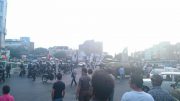I believe it will be useful to make a little historical excursus. Unlike Russian and Ottoman Empire, Iran was not a great empire stretching from one continent to another since the times of Cyrus. The last moments (exactly moments, because for history years of the reign of any ruler are nothing but a moment) of the past greatness of Iran are associated with the Turkic rulers from the Safavid, Afshar and Qajar dynasties.
After the Islamic revolution, Persian nationalism and Shiite ideology got mixed in Iran. Mullocracy created a unique ideology in Iran, incorporating both Shiism and Persian nationalism, which is based on the myths of the pre-Islamic period.
This whole ideological stream, in turn, created in Iranian society, on the one hand, an image of a “fortress surrounded by enemies”, and on the other hand, stimulated hurt national ego of the Iranians, Persians for the most part.
This situation gave rise to a number of widespread phobias in Iran. Among them are “anti-Semitism”, “turkophobia” and “arabophobia” (three important pillars of the pantheon of Persian nationalism and superiority concept).
These three phenomena are widely disseminated in the Iranian media (including state media), social networks and in everyday life.
This is despite the fact that millions of people of Turkic and Arab origin live in the country. As a result of the promoted “Turkophobia”, one can often hear in Iran an expression – ترک خر – torke har – which means “Turkic donkey”, directed towards Azerbaijanis and Turkomans living there, while in relation to the Arab population representatives of Persian nationalist circles use an expression عرب ملخخور- arabe melekhor – which means “locust-eating Arabs”, and such derogatory terms exist and are used in relation to all non-titular ethnicities inhabiting Iran. And this situation continues for more than a year or a decade.
Representatives of ethnic minorities, who tried to protest against the racist slurs of the authorities and nationalists were either arrested, or forced to leave the country, and some even paid with their lives.
The poem, recited by Turkish President Recep Tayyip Erdogan during the parade in Baku, did not in any way concern or question territorial integrity of Iran. It’s just that the Iranian regime and chauvinistic circles in Iran regard the territory of the South Caucasus as the territory of “Northern Iran”. And part of the country’s population is perceived by the same circles as a fifth column, and that is exactly what caused Iran’s hysterical reaction.
On the one hand, the hurt ego of Iranian nationalism, on the other hand, the ages-old contempt for the Turks and for everything Turkic on part of the Persian nationalists, dressed in the guise of Shiite mullocrats.
Iran goes through really tough times now (pandemic, economic crisis, internal divisions), and in such a situation the regime and its lapdogs will become more aggressive.




Be the first to comment at "A few words about anti-Turkish hysteria in Iran"